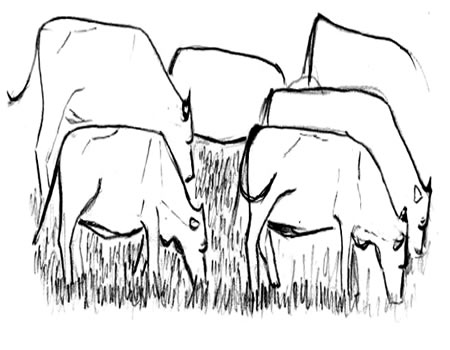The idea underlying a colony, both in antiquity and in modern times, is that of settlement ( see British Settlements Act 1887) A colony is a place for the settlement of people “with common or similar language, interests or occupations, living together in close association”, like the farm settlements established in some parts of the Eastern Region of South-East Nigeria by the Government of M.I. Okpara. A colony as a settlement for people is one integrated idea, it cannot be separated from a settlement; it cannot meaningfully exist divorced from such a settlement, except as a mere idea without existential content. So divorced, it means nothing but an empty word tendentiously employed to beguile or hoodwink the public. The cattle colonies which the Federal Government proposes to establish in every State of the Federation can, therefore, mean nothing other than a place for the settlement of Fulani herdsmen, however much the Federal Government may try to hide this fact, by, for example, calling it “cattle colony”; that is what it is intended to be, and will eventually become, if it is not such from inception.
Its character as a place for the settlement of Fulani herdsmen is implicit in the Agric Minister’s long presentation giving details of the proposed project, as published in the Nigerian Tribune newspaper of 12 January, 2018, which leaves him no room to gainsay it. It is not the idea that cattle is to be left in a colony without a herder or keeper, without someone to feed it, give it water, and keep a watchful and protective eye on it. Rearing cattle or livestock necessarily requires a herder. From what we know, two or more herders will be needed to follow and tend 100 cows; accordingly, 300 herders will be needed to tend 30,000 cows. A colony of 30,000 cows requires 300 herders living in the colony. It may be expected that a herder may have a family, a wife (wives) and children living with him in the colony. We are therefore talking of 300 Fulani herdsmen and their families lodged in the body of a State under the scheme.
Lets listen to what the Agric Minister said: “We are talking of colonies because 20, 30, or 40 ranchers can share the same colony. A ranch is usually owned by an individual or a company with sometimes very few cattle. Some have more than 200 or 300 cows. In a cattle colony, you could find 30,000 cows owned by different owners. The reason we are designing the colony is that we want to prepare on a large scale, on economy of scale, a place where many owners of cattle can coexist, be fed well, because we can make their feeds. They can get good water to drink. Cows drink a lot of water. We can give them green fodder.” The Hon. Minister talks only of cattle owners or ranchers, but not at all of herders, who are essentially the cause of the problem. The cattle owners or ranchers are no doubt a part of the problem but the part they play seems somewhat peripheral. The herdsmen are at the centre of the problem.
From the Minister’s presentation, the cattle colony scheme may magnify the problems beyond what they presently are. The scheme is not intended to, and will not, stop the open grazing practice, which is the main cause of the problem. It may well reduce, but will not completely stop it. The Hon. Minister of Agriculture affirms this when he said: “We will tell the herdsmen, if you are passing through a state, you can only go to the colony and stay there, feed your cattle and, when you are moving off, agro-rangers will follow you and make sure you don’t destroy anybody’s farm.” This statement is confusing to say the least. It seems to suggest that a cattle colony as a settlement for herdsmen and their cattle will be combined with the existing practice of herdsmen roaming over the whole country with their cattle, but stopping at a colony to feed them.
The legal and political implications of the scheme
The Minister’s emphasis on the process of acquiring land for the colony is misdirected. The issue is not so much about the process for acquiring land, but about the ownership of the land after it is acquired and, more important, about the right to the exclusive use, management and control of the land so acquired. Does the ownership of the land belong to the Federal Government, or to traditional communities, villages and families supposed to have been divested of it? Does the right to the exclusive use, management and control of the land belong to the Federal Government, the cattle owners or the herdsmen?
Perhaps, more worrisome, is the issue of the relationship of the Fulani herdsmen settled on the land and the political authorities in the State – the state government, the local government authorities and the traditional authorities, the town unions, the community development associations, the civil defence and vigilante groups, etc. Will the Fulani herdsmen settled on the land, the cattle owners and their association, the Miyetti Allah, not constitute themselves a “state” within a state?The deadliest of the implications of the establishment of cattle colonies in every State of the Federation is the religious and cultural implications.
Religious implications of the establishment of cattle colonies in every state of the federation
In considering the religious implications of establishing cattle colonies in every State of the Federation, it is necessary to recall to mind what Sheikh Gumi wrote about Sir Ahmadu Bello, the Sardauna of Sokoto. According to Gumi, the Sardauna’s well-known agenda of consolidating and perpetuating the idea of Northern Nigeria as one united entity “was not borne out of political consideration only”, but was also conceived as “a personal mission” handed down to him by his forbear, Sheikh dan Fodio.
(To be continued).
- Professor Nwabueze (SAN) is an elder statesman




